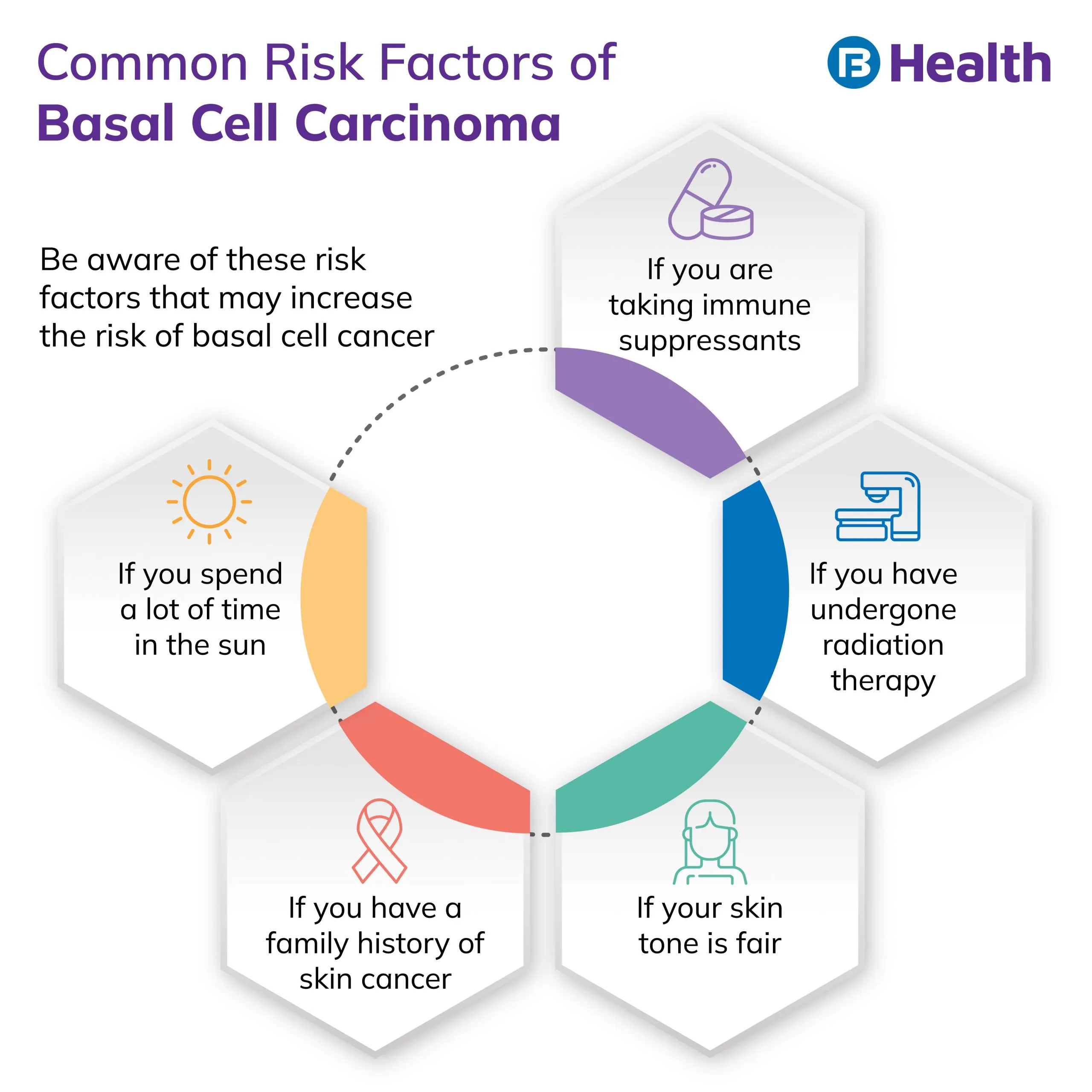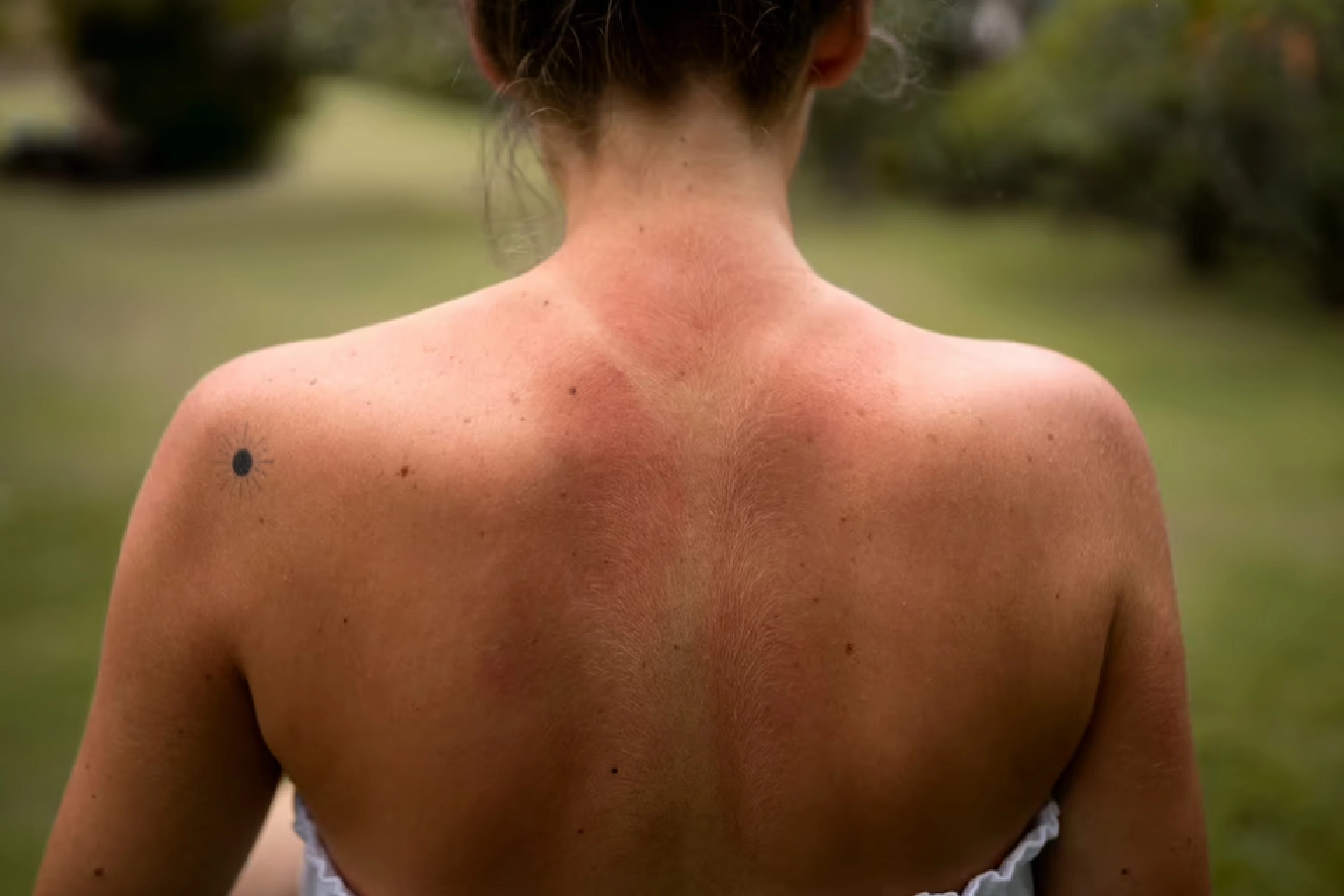Physical Medicine and Rehabilitation | 5 min read
Basal Cell Carcinoma: Symptoms, Causes, and Treatment
Medically reviewed by
Table of Content
Synopsis
When basal cells grow in an uninhibited manner, it is called basal cell carcinoma. Basal cell cancer develops due to ultraviolet radiation exposure. Read to know about basal cell cancer treatment.
Key Takeaways
- Basal cell carcinoma is the most widespread type of skin cancer
- A mutation in the DNA of basal cells causes basal cell cancer
- Different types of basal cell carcinoma have different symptoms
Basal cell carcinoma is a type of cancer affecting your skin. As the name indicates, basal cell cancer develops in the basal cells of your skin. You may be aware that the outer layer of your skin is called the epidermis. Cells found in the lower part of the epidermis are called basal cells. These cells are primarily responsible for the replacement of old cells with new cells. In this type of cancer, your basal cells continue to grow in an uncontrolled manner.
When basal cell carcinoma affects these cells, it results in the development of tumors on the surface of your skin. You can see these tumors in the form of bumps, red patches or scars. At the onset of this condition, you may see a transparent bump formed on the surface of your skin. Basal cell cancer most commonly affects your neck and head as these parts are exposed to the sun. Prolonged exposure to ultraviolet radiation results in this cancer. Using sunscreens and avoiding sun exposure can reduce the risk of skin cancer.
According to a report, it is the most prevalent type of skin cancer affecting people globally. What may be good to know is that the percentage of skin cancer in India is less than 1% [1]. There is a higher prevalence of basal cell cancer in Western countries, as per a study [2]. When you are aware of the symptoms and types of basal cell carcinoma, it helps in the early diagnosis of this condition. Timely diagnosis of basal cell cancer helps cure the condition. To know more about the types, causes, symptoms and basal cell carcinoma treatment, read on.
 Additional read: A Guide on Melanoma Skin Cancer
Additional read: A Guide on Melanoma Skin CancerTypes of Basal Cell Carcinoma
Here are the four different types you should know.
In the nodular type, there is a growth of a transparent nodule. When this nodule increases beyond 1cm, it may break which causes ulcer formation. This type occurs most commonly on your face.
The second type is called superficial spreading basal cell carcinoma. It occurs most commonly on your upper back. It is characterized by the formation of pink and shallow plaques. Since these lesions are soft, a minor scratch can result in bleeding.
In the pigmented type, you can see the formation of pigmented nodules on the skin. These pigments develop around the base of nodules.
The last type is called sclerosing basal cell carcinoma. During its early stage, there is a development of a white scar on your skin. The scar, which is small at the start, expands slowly. This type occurs commonly on the face.
Be aware of these types of cancer. If you notice any unusual changes in your skin, visit a skin specialist to rule out any possibility of skin cancer.
Causes of Basal Cell Carcinoma
The main cause of basal cell cancer is the prolonged exposure to UV radiation. This type of cancer develops when the DNA in basal cells undergoes mutation. Since basal cells are involved in producing new cells, it is the DNA which instructs the cells to multiply. When the mutation happens in DNA, basal cells begin to multiply and grow in an uncontrolled manner. This process results in the formation of basal cell cancer. Ultraviolet light from tanning lamps can also cause this cancer type.

Symptoms of Basal Cell Carcinoma
Check these warning signs and consult a doctor without any delay.
- Presence of red patches on the skin mimicking eczema
- Formation of scars on the skin
- Itchiness on the skin
- Appearance of nodules with blood vessels
- Presence of a waxy growth on the skin
- Development of a small bump that gradually increases in size
Diagnosis of Basal Cell Carcinoma
A skin specialist such as a dermatologist examines your patches and scars throughout the body. If there is any abnormal growth on the skin, you’ll have to undergo a biopsy. A biopsy is a procedure in which the doctor extracts a skin tissue from your skin lesion for a further detailed examination. Your doctor may also inquire about your medical history and family history of cancer. Based on the investigation report, your doctor prescribes a suitable basal cell carcinoma treatment plan. This may usually be in consultation with a cancer specialist.
Basal Cell Carcinoma Treatment
Basal cell carcinoma treatment depends on various factors such as age, health conditions, cancer type and spread of cancer. One standard basal cell carcinoma treatment method is electrodesiccation and curettage. This method involves the removal of lesions using a curette. Then, the area affected by basal cell carcinoma is burnt using a specific electric needle. This treatment plan is ideal for small lesions. Remember, if the extent of cancer is severe, this method may not work.
There are surgery procedures for treating basal cell carcinoma too. In excisional surgery, the tumor and the area surrounding it are removed. After the excision, the area is closed using surgery. Another procedure, Mohs micrographic surgery, involves the removal of the tissue layer with cancerous growth. After mapping it under a microscope, the surgeon applies the same technique to the exact location of the tumor.
A few other methods of treatment include.
- Applying lasers
- Using chemotherapy medications
- Executing photodynamic therapy
Reducing your exposure to ultraviolet light is the best way to reduce the risk of basal cell carcinoma. In case of regular sun exposure, make sure to use sunscreen. Avoid stepping out during the hottest hours of the day. If you notice any unusual changes on the skin, meet a specialist and undergo different tests for cancer. Be it any skin conditions like keratosis pilaris or eczema, meet a dermatologist without any delay. Connect to top skin specialists on Bajaj Finserv Health and get a doctor consultation via the app or website. Solve all your skin problems and nip them right in the bud!
References
- https://www.ncbi.nlm.nih.gov/pmc/articles/PMC4963704/#:~:text=In%20India%2C%20skin%20cancer%20constitutes,prevalent%20skin%20malignancies%20%5B3%5D.
- https://www.ncbi.nlm.nih.gov/pmc/articles/PMC3051301/
Disclaimer
Please note that this article is solely meant for informational purposes and Bajaj Finserv Health Limited (“BFHL”) does not shoulder any responsibility of the views/advice/information expressed/given by the writer/reviewer/originator. This article should not be considered as a substitute for any medical advice, diagnosis or treatment. Always consult with your trusted physician/qualified healthcare professional to evaluate your medical condition. The above article has been reviewed by a qualified doctor and BFHL is not responsible for any damages for any information or services provided by any third party.





